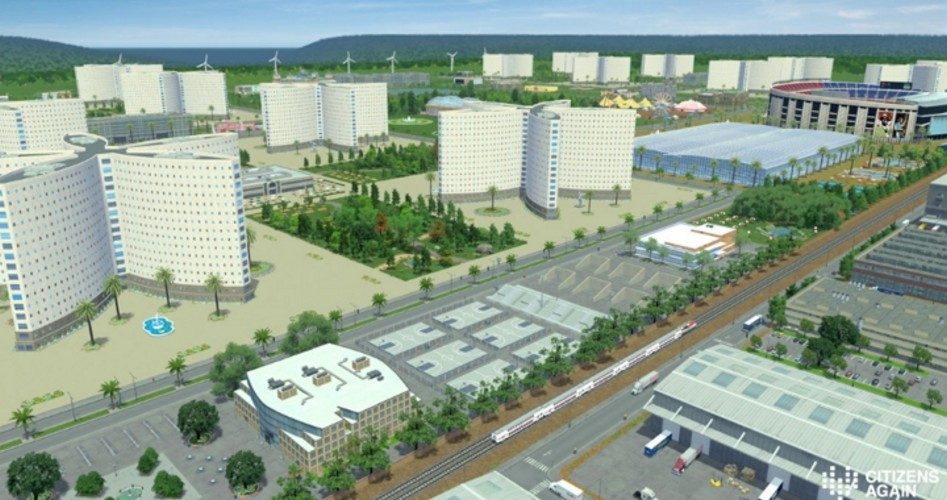
It’s not surprising that a private organization in California, the state with the nation’s worst homelessness problem and one of the most inept governments, is attempting to raise money to build a 300-acre city for the homeless.
The plan calls for the building of an entire city. Instead of hundreds of small shelters scattered all around the state, the group Citizens Again looks to build a residence for the homeless that can house up to 150,000 people in a single 300-acre area. The plan calls for high density dormitory-style housing, somewhere outside of the “urban core” of cities where residents might be spared the temptations the mean streets have to offer.
Currently, there are an estimated 130,000 homeless people in California alone, almost a quarter of the country’s total. The proposed city will concentrate on the “high-needs” chronic homeless population.
Duane Nason, founder of Citizens Again, hopes to raise money for the initial build through a mixture of crowd funding, philanthropy, and government sources. Eventually, Nason hopes that a combination of taxpayer funds along with profits from sales and services that citizens of the “city” generate themselves will sustain the project.
Citizens Again looks to have their city fully built and running by 2031, assuming they can garner funding — not an easy task. As of Monday afternoon, an initial GoFundMe campaign has raised just $1,075 of its $50,000 goal.
{modulepos inner_text_ad}
“It’ll be a city they’ll want to live in, a community they’ll want to be a part of, and for those that desire, an opportunity to gain life skills to integrate back into society,” according to the group’s website.
Nason envisions a city that can offer residents a hand up or a permanent residence — whatever a resident might choose. Theoretically, citizens will be allowed to leave the city at any time, but Nason says, “Some might want to stay forever.” If residents do choose to leave the city, there will be a waiting period for reentry to discourage a revolving door situation.
Residents will need to be “qualified” at processing centers prior to being allowed into the city. Exactly what those qualifications are is not yet known. Residents would be required to wear a wristband with an RFID chip in order to gain entry to their dorm room and other facilities in the city.
Once qualified, residents will be teamed up with an existing resident who will show them around the city.
Among the amenities the creators envision would be private sleeping quarters, communal bathrooms with private showers, and theater-seating television for all residents to enjoy. There will also be job training, a credit system for purchasing items and meals, medical facilities, and easy access to other social services.
Underground tunnels will be built throughout the city to allow deliveries to be made and for city workers to commute to jobs. The tunnels are meant to “minimize disruption of citizen life.”
“For those who wish to better themselves, or prepare to reenter society, the City will provide: Counseling and therapy, Life skills training, educational services, Job training, reentry support services.”
Citizens Again believes that by housing homeless persons in one place, rather than having them strewn about the state and the country haphazardly, would greatly lower the costs in general and would substantially reduce the amount of money taxpayers would need to shell out per person.
While Citizens Again should be credited for thinking outside the box on the rampant homelessness issue in California, it’s not a plan without bugs. In fact, the proposed city is a potential ant farm full of bugs.
While there may be many homeless people who will look to “better themselves” and work hard, that is obviously a choice that the residents will make — not a requirement. What will happen when the people of this “City” see that many choose not to work to better themselves but just live off the dole?
The chronic, long-term homeless population they look to serve are homeless for any number of reasons. Sometimes, financial circumstances are the least of the problems for the homeless. Chronic drug abuse, alcoholism, and mental illness are just some of the problems facing the population that Citizens Again clients might house.
While the rules the group looks to enforce in the new city look good on paper, many homeless people are misanthropes who do not handle structure well. With 150,000 such folks living in very close quarters, security staff must be on the level of a major city’s police force.
Not to mention that the description of the “City” has the feel of the “Weedpatch” socialist work camp described in John Steinbeck’s The Grapes of Wrath. With its “credit system” and RFID wristbands, the new city described by Citizens Again sounds like a high-tech version of Steinbeck’s socialist utopia.
Socialism does not work under the best of circumstances. Venezuela, a nation with vast petroleum deposits, should be a wealthy and happy place. But it added socialism, and it is now a place of bread lines and civil unrest. The city that Citizens Again proposes won’t have vast resources to exploit — only unhappy and indigent people.
Image: citizensagain.com
James Murphy is a freelance journalist who writes on a variety of subjects with a primary focus on the ongoing anthropogenic climate-change hoax and cultural issues. He can be reached at [email protected].




